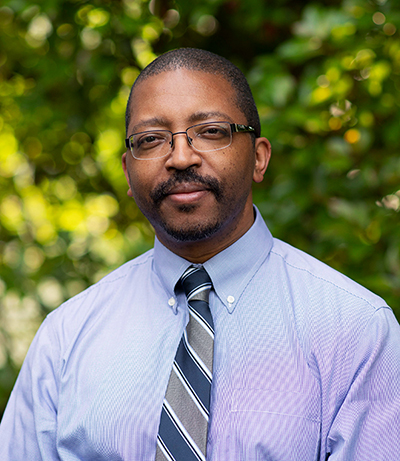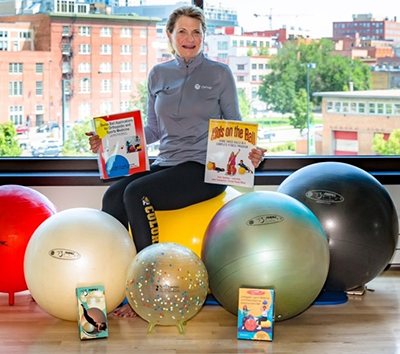Joanne Posner-Mayer Endowed Chair in Physical Therapy
Michael Harris-Love leads CU’s Physical Therapy Program
By Courtney Keener (October
2020) Michael Harris-Love, PT, MPT, DSc, who became the head of the University of Colorado School of Medicine Physical Therapy Program last year, describes himself as an “unlikely candidate” for physical therapy school.
(October
2020) Michael Harris-Love, PT, MPT, DSc, who became the head of the University of Colorado School of Medicine Physical Therapy Program last year, describes himself as an “unlikely candidate” for physical therapy school.
For
six years, he worked to save money for his education while attending community college along the way, and changing majors several times. “Generally speaking,” he said, “having few financial resources and a host of eclectic interests
is not a recipe for academic success.”
Harris-Love worked as a computer-aided design and manufacturing technician at a Motorola plant in Arizona. During that time, he would visit the company library during his lunch to read about
other careers. He found the profession of physical therapy appealing, so he began logging volunteer clinical service hours needed to apply to most PT schools.
When Motorola announced layoffs, he leapt at the chance. The severance
package gave him the necessary resources to pursue his undergraduate degree as a full-time student.
During his senior year at Northern Arizona University, Harris-Love attended a career fair where he met a senior member of Mayo Clinic’s
admissions team. At the time, Harris-Love was considering six schools with PT programs. Mayo was not on that list.
Yet, after interviews in three states over several months, Harris-Love accepted the offer from Mayo Clinic’s PT Program.
It was 1995 and Harris-Love was the first Black man in enrolled in the program. After graduation in 1997, he launched his clinical career at Mayo Clinic and joined the National Institutes of Health’s Clinical Center in 1999.
Most
recently, Harris-Love held multiple appointments at separate locations in the Washington, D.C., area. That required shuttling between sites at the VA Medical Center, the Milken School of Public Health at George Washington University, and the College
of Health and Human Services at George Mason University.
“Having held various positions in medical centers, universities, and federal government, the possibility of being affiliated with these entities at one campus at CU Anschutz
was very appealing,” he said.
In that one campus, he found a welcoming home. The School of Medicine’s support for the program and its dedication to inclusive, collaborative culture was an important feature. The Posner-Mayer
Endowed Chair provided critical resources for recruiting Harris-Love and will allow him to implement a plan for a more diverse and equitable PT program.
Harris-Love brings extensive clinical research experience to campus. He
has contributed to the development of standardized outcome measures for clinical trials involving participants with muscle disease, and his current research is focused on developing innovative exercise interventions for those with sarcopenia, or muscle
loss.
A Philanthropic Partnership
The CU PT Program celebrated its 70 anniversary in 2017. The program’s previous director, Margaret Schenkman, PT, PhD, a renowned Parkinson’s disease researcher, helped build the program into one of the nation’s best. Graduates and benefactors
like Joanne Posner-Mayer, PT ’73, also made the program stronger.
In addition to establishing the Posner-Mayer Endowed Chair held by Harris-Love, she has funded scholarships to attract a diverse and talented student population
and hosted annual receptions. She is also an active member of the CU Foundation Board of Trustees, CU PT Scholarship & Endowment Board, and an emeritus member of the Physical Therapy Alumni Association.
“I am proud to be associated
with such an outstanding program, and honored to express my gratitude to CU for accepting me as a student five decades ago,” Posner-Mayer said. “Through this endowed chair, I hope to help create an even better learning environment for
students as they pursue their education.”
Impact for CU PT
"The endowed chair is in many ways a reflection of the growth and maturity of the physical therapy profession itself,” Harris-Love said. “During my initial years of clinical practice at the Mayo Clinic in the late 90s, 33 states had direct
access to physical therapy, whereas today, every state has some form of direct access.”
Yet even as the discipline has become more widespread, the field must improve its diversity and inclusion efforts. “There were six
black physical therapy directors across the country when I graduated,” he said, “and there are still six today, despite the number of programs increasing during this span of time. There is still much work to be done.”
Posner-Mayer said she is confident that Harris-Love will make significant contribution to those efforts.
“Dr. Harris-Love is committed to promoting a diverse and inclusive culture, and brings a perspective that will be important
to the future of the program and the profession,” she said.
One way to do that is to look for talented students in unexpected places in the same way that the Mayo recruitment officer found Harris-Love.
“Considering
my own nontraditional academic journey,” Harris-Love said, “this endowed chair will also fuel our continued efforts to recruit and support nontraditional students, and to help broaden our view of who can become a physical therapist or
the next great rehabilitation scientist.”
Among his goals, Harris-Love plans to strengthen existing PT residency programs, increase efforts to support rural practice, and improve PT access for underserved populations in Colorado,
including urban areas including the neighborhoods near the Anschutz Medical Campus.
“It means doing our part to usher physical therapy into a near future where the value of our care is linked to the public health goals of Colorado and beyond.”
Joanne Posner-Mayer, PT ’73
|
Michael Harris-Love
Professional Appointments
Selected Highlights
2019-present
Program Director and Professor, Physical Therapy Program, University of Colorado School of Medicine
Associate Dean, Physical Therapy Education University of Colorado School of Medicine
Health Scientist, Geriatric Research Education and Clinical Center, VA Eastern Colorado Healthcare System
2015-2019
Associate Director, Human Performance Research Unit, Clinical Research Center, VA Medical Center, Washington, D.C.
2014-2019
Site Director, Exercise Science/Health Science Internship Program, VA Medical Center, Washington, D.C.
2014-2019
Associate Clinical Professor, Department of Exercise and Nutrition Sciences, Milken School of Public Health at George Washington University, Washington, D.C.
2013-2019
Director, Muscle Morphology, Mechanics, and Performance Laboratory, VA Medical Center, Washington, D.C.
2012-2019
Deputy Director, Polytrauma/TBI Rehabilitation Research Fellowship, VA Medical Center, Washington, D.C.
2005-2010
Adjunct Assistant Professor, Department of Physical Therapy and Rehabilitation Science, University of Maryland
2005-2008
Assistant Professor, Program in Physical Therapy, George Washington University, Washington, D.C.
2004-2009
Adjunct Faculty, Krannert School of Physical Therapy, University of Indianapolis
1999-2005
Rheumatology Clinical Specialist, Physical Therapy Section, Rehabilitation Medicine Department, Mark O. Hatfield Clinical Center, National Institutes of Health, Bethesda, Maryland
Education
2010 Georgetown University/Children’s National Hospital, Post-Doctoral Fellowship
2004 University of Indianapolis, Doctor of Health Science
1997 Mayo School of Health Sciences Program in Physical Therapy, Rochester, Minnesota, Masters of Physical Therapy
1995 Northern Arizona University College of Health Professions, Bachelor of Science, Cum Laude
Features
- Getting Back to School Safely During a Pandemic
- Caring For Older Adults During a Pandemic
- Cleft Lip Repair Surgery Inspires Teenager to Help Others
- Reducing Cancer Disparities in Colorado
- Where are they now? 2010 CU School of Medicine Presidential Scholars
In their own words:
Profiles
- Carlos Franco-Paredes works to protect detainees from COVID-19
- Michelle Barron is a top infectious disease expert and fearless protector
- Art project collects portraits of unsung heroes fighting COVID-19
- Carey Candrian studies ways to improve care for older LGBT adults
- Michael Harris-Love leads CU’s Physical Therapy Program
Peaks
- Charles Dinarello Awarded the 2020 Tang Prize in Biopharmaceutical Science
- COVID-19 vaccine trial in Colorado led by School of Medicine and UCHealth
- Non-Hormonal Treatment for Menopausal Symptoms Offers Hope of Relief
- Children’s Hospital Colorado ranked No. 6 in the country
- Doris Duke Charitable Foundation Renews Support
- In the News
